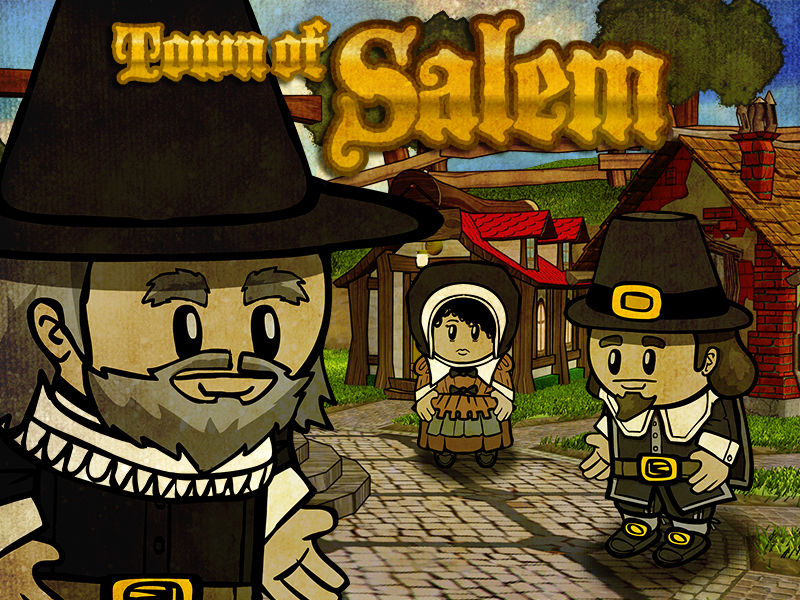Ladies and gentlemen, I am breaking from my staid tradition of covering board games alone for game breakdowns. As game developers, we owe it to ourselves not to play simply board games, but video games, social games, mobile apps, and more. For today’s game breakdown, I’m covering the online version of Town of Salem, not the card game.
Looking for more resources to help you on your board game design journey?
Here you go: no email required!
Like this writing style?
Check out my latest blog on marketing here.
A little bit of background: in the late years of my undergraduate studies in the autumn of 2013, Town of Salem got really big in my friend group. We played it a lot for a month or two. There was a time in my life where I was playing three or four hours of it a day.

It’s like the old card game Mafia, except with greater variety, online interaction, and whole, whole lot of metagaming. It wasn’t perfect. The online community was dodgy at best – a lot of young kids, a lot of trolls, and a lot of people just plain dropping out mid-game. But it was fun – plain, simple, really good fun.
For the sake of simplicity, I’m going to describe the rules of only a Classic mode game as they were when the game first came out. It’s changed a little since I was really into it and there’s lots of variations on the regular game.
It’s a 15 person game. It’s a game of social deduction, persuasion, and manipulation. Everybody is broadly split into three teams: Mafia, town, and neutral. For the Mafia to win, they must kill all the townsfolk. For the town to win, they must kill the Mafia and the serial killer. For neutral players to win, they have to accomplish their own objectives. Right off the bat, you notice that you can have multiple winners, one winner, or no winners.

To explain what I mean further, here’s a list of roles which people are assigned in Town of Salem:
- Sheriff (Town): Checks one person every night for suspicious activity – can be fooled by Framer.
- Doctor (Town): Visits one person every night, saving their life if someone tries to kill them.
- Investigator (Town): Checks one person every night for an ambiguous clue about their role.
- Jailor (Town): Jails one person every night, stopping them from doing anything. May choose to execute the incarcerated – but if they guess wrong, they lose that power.
- Medium (Town): Can communicate with the dead via chat.
- Lookout (Town): Watches one person every night to see who visits them.
- Veteran (Town): If this player goes “on alert”, he or she kills anyone who visits them.
- Vigilante (Town): If this player thinks they know who the Mafia is, they can choose to shoot them. If they guess wrong, they kill themselves out of guilt.
- Escort (Town): This player “distracts” one person every night, blocking their role.
- Godfather (Mafia): This person chooses one person to kill every night.
- Framer (Mafia): This person can frame someone else for a crime, fooling the Sheriff.
- Mafioso (Mafia): This person carries out the Godfather’s orders and becomes the Godfather if the Godfather dies.
- Executioner (Neutral): This person’s sole task is to get the town to hang their designated victim using whatever means necessary.
- Jester (Neutral): This person’s sole task is to get the town to hang them!
- Serial Killer (Neutral): This person kills one person every night.
Every night, when the sun goes down, everybody goes back to their houses. The Mafia conspires to kill someone, the serial killer does what their namesake suggests, and the town goes around trying to stop the damage and gather information. Every day, all players start discussing what happened, taking note of who died, and start trying to figure out everyone’s roles. The town then chooses a person they would like to hang and then they vote on whether to go through with it. The Town wants to see the Mafia and serial killer hanged and the Mafia wants to see the townsfolk hanged.
Gruesome, I know. Also a bit of a mouthful to try to explain, but trust me when I say it’s fairly straightforward. You learn what every role does in a few games. It takes about an hour to function well in Town of Salem, which is about on track with medium-weight board games.
Then it gets heavy.
From these simple rules, great complexity arises.
Consider this, my friends: under the veil of anonymity, with no way to convince people of who you are, how do you – as the Sheriff – convince the town of who’s Mafia? Further, if you do convince the town and the person you saw hanged was actually framed by the Framer, how do you avoid having the town hang you next round, thinking you’re the Mafia or Executioner? Further still, if you’re found to be right, what’s to stop the Mafia from killing you? You are, after all, dependent upon the tender mercies of the Doctor or the lucky guess of the Escort to save your life.
That’s just the Sheriff. From one role comes a dozen questions of how to proceed and how to persuade. Information is scarce, trust is low, and the risk of getting killed for sticking your neck out is high.
Suppose you’re the Jester. How do you convince the town to kill you? Should you act like a not-so-bright version of the Serial Killer or Mafia? Should you type in chat like a child? Should you act really annoying? Should you just wait for a better time? Should you pretend to mistype the whisper command so that your “private message” to someone else that “I’m glad we targeted SoAndSo last night” is seen by the whole town?
Literally every role comes with a complex set of tactics and behaviors that must be mastered. In addition, you have to be able to read the room you’re playing in. Your approach will be different in a room full of children than it will be with adults, as it will be different in a room full of newbies than it will with veteran players.
Town of Salem is a tight, thoughtful game that trusts its players to make it interesting.





One thought on “Town of Salem: Making a Complex Social Deduction Game with Simple Rules”